The department has the following laboratories to meet the requirements of CSE. All the laboratories in the department are well equipped with the latest software’s and technologies so as to provide required infrastructures to carry in-house projects for final year students as well as R&D activities.
- Programming for problem solving in C
- Data Structures Lab
- Data Base Management Systems Lab
- Java Lab
- Complier Design Lab
- Operating Systems Lab
- Case Tools and Web Technologies Lab
- Linux Programming Lab
- Data Warehousing and Data Mining Lab
- IT Workshop Lab
- SDC (DATA VISUALIZATION-R PROGRAMMING/ POWER BI)
- Computer Networks Lab
- Web Technologies Lab
- Skill Development Course(UI Design-Flutter)
- Machine Learning Lab
- Cloud Computing Lab
- Scripting Languages Lab
- FULL STACK DEVELOPMENT LAB

Programming for problem solving in C:
This lab is a part of I B. Tech for CSE students. We propose an approach to the description of the semantics of data structures in programming languages, we make the student to learn and solve the problems and implement linear data structures such as Lists, Stacks, Queues, Searching and Sorting methods, Linear regression algorithms, Interpolation, Trapezoidal method and Simpson methods with recommended systems/software requirements following the university prescribed textbooks and Lab manuals. The expected outcomes from the students are:
- Document and present the algorithms, flowcharts and programs in form of user-manuals
- Ability to identify and apply the logical ability to solve the data structures problems
- Apply the concepts of compiling, debugging, linking and executing a program using the development environment
- Analyzing the complexity of problems, Modularize the problems into small modules and then convert them into programs

Data Structures through C++ Lab
This lab is as a part of II B. Tech I semester for CSE students. We propose an approach to the description of the semantics of data structures in programming languages, we make the student to learn and solve object oriented problems and writing abstract data types for all data structures such as arrays, linked lists, stacks, queues, trees, hash tables, search trees and various sorting and searching methods with recommended systems/software requirements following the university prescribed textbooks and Lab manuals. The expected outcomes from the students are:
- Ability to identify the appropriate data structures for given problems
- Graduate able to design and analyze the time and space complexity of algorithm or program
- Ability to effectively use compilers includes library functions, debuggers and trouble shooting

Database Management Systems Lab:
This lab is a part of II B. Tech II semester for CSE students. Database Management System or DBMS in short refers to the technology of storing and retrieving users’ data with utmost efficiency along with appropriate security measures. This lab enables the students to practice the concepts like E-R model, data models, data schemas, data independence.
ence, relational database design, storage and file structure and much more in the DBMS subject by developing a database. The student is expected to practice the designing, developing and querying a database in the context of database to be created with MySQL with recommended systems/software requirements following the university prescribed textbooks and Lab manuals. The expected outcomes from the students are:
- Ability to design and implement a database schema for given problem
- Be capable to design and build a GUI application
- Apply the normalization techniques for development of application software to realistic problems
- Ability to formulate queries using SQL DML/DDL/DCL commands

Object Oriented Programming Lab / Java Programming Lab:
This lab is as a part of II B.Tech II semester for CSE students. The Java Programming Lab introduces java compiler and Eclipse platform and covers Applets, JDBC, Abstract Classes, Mouse Events, Meta-Data, Multithreaded Programs, Exception Handling and OOPS concepts. The students are expected to practice and implement the above said technologies with recommended systems/software requirements following the university prescribed textbooks and Lab manuals. The expected outcomes from the students are:
- To understand basics of Java Programming, multi-threaded programs and Exception handling
- The skills to apply OOPS concepts in java programming and problem solving
- Ability to access data from a DB with Java programs
- Use of GUI components (Console and GUI based)
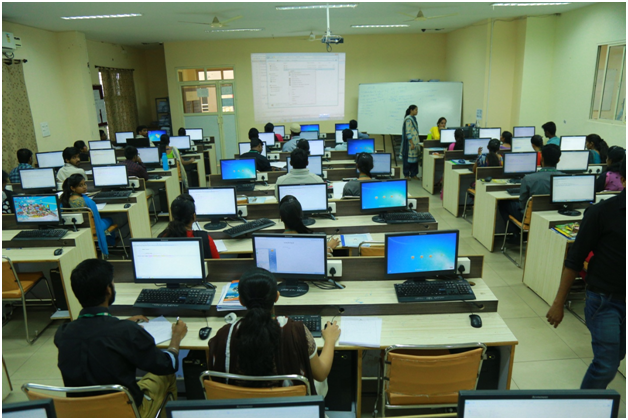
Compiler Design Lab:
This lab is as a part of III B.Tech I semester for CSE students. Compiler design principles provide an in-depth view of translation and optimization process. This lab enables the students to practice basic translation mechanism by designing a complete translator for a mini language and error detection & recovery. It includes lexical, syntax, and semantic analysis as front end, and code generation and optimization as back-end with recommended systems/software requirements following the university prescribed textbooks and Lab manuals. The expected outcomes from the students are:
- To understand the practical approach of how a compiler works
- To enable to work in the development phase of new computer languages in industry
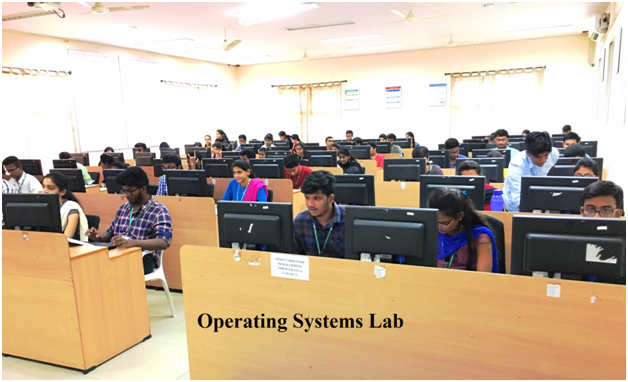
Operating Systems Lab:
This lab is as a part of III B.Tech I semester for CSE students. The objective of this lab is to teach students about various operating systems including Windows, Mac and Unix. Students learn about systems configuration and administration. Students learn, explore and practice technologies related to scheduling policies, memory management techniques, process concurrency and synchronization, I/O storage and file management and to study different operating systems with deadlock recovery and avoidance with recommended systems/software requirements following the university prescribed textbooks and Lab manuals. The expected outcomes from the students are:
- Apply optimization techniques for the improvement of system performance
- Ability to understand the synchronous and asynchronous communication mechanisms in their respective OS
Learn about minimization of turnaround time, waiting time and response time and also maximization of throughout with keeping CPU as busy as possible.
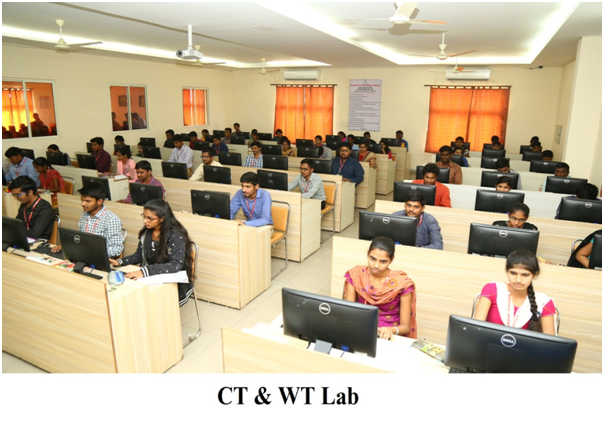
Case Tools & Web Technologies Lab:
This lab is a part of III year B. Tech II semester for CSE students. Case tools refers to the application of the UML to solve common modeling problems and master the vocabulary, rules, idioms of the UML for the process of developing software systems using Use Case Diagram, Class Diagram, Sequence Diagram, Collaboration Diagram, State Diagram, Activity Diagram, Component Diagram, Deployment Diagram, Test Diagram. The student is expected to practice the above said diagrams with the design of simulated automated machine with recommended systems/software requirements following the university prescribed textbooks and Lab manuals. The expected outcomes from the students are:
- Ability to understand the history cost of using and building CASE tools
Web Technologies:
This lab is a part of III B. Tech II semester for CSE students. This section provides information about web technologies that relate to the interface between web servers and their clients. This information includes markup languages, programming interfaces and languages, standards for document identification and develops interactive web applications with client side script technologies for solving web client/server problems with technologies like HTML, Java Script, AJAX, PHP, XML, Servlets, JSP and BEANS. The students are expected to practice and implement the above said technologies with recommended systems/software requirements following the university prescribed textbooks and Lab manuals. The expected outcomes from the students are:
- To use LAMP Stack, Tomcat Server for Web applications
- To write applications for the above said technologies with connection to databases and get results

Linux Programming Lab:
This lab is as a part of IV B. Tech I semester for CSE students .The Linux programming laboratory course covers major methods of Inter Process Communication (IPC), which is the basis of all client / server applications under Linux, Linux Utilities, working with the Bourne again shell (bash), files, process and signals. There will be extensive programming exercises in shell scripts. It also emphasizes various concepts in multithreaded programming and socket programming. The students are expected to practice and implement the above said technologies with recommended systems/software requirements following the university prescribed textbooks and Lab manuals. The expected outcomes from the students are:
- The ability to understand Linux environment
- The ability to perform the file management and multiple tasks using shell scripts in Linux environment

Data Warehousing and Data Mining Lab:
This lab is as a part of IV B. Tech I semester for CSE students. The Data Mining Lab course covers the data sets and data preprocessing and to build data warehouse and query it and also to perform data mining tasks using a data mining toolkit. Demonstrate the working of algorithms for data mining tasks such as association rule mining, classification, clustering and regression, Exercise the data mining techniques with varied input values for different parameters on real world data sets. The students are expected to practice and implement the above said technologies with recommended systems/software requirements following the university prescribed textbooks and Lab manuals. The expected outcomes from the students are:
- The ability to add mining algorithms as a component to the exiting tools
- The ability to apply mining techniques for realistic data

IT Workshop Lab:
This lab is a part of I B. Tech for CSE students. We propose an approach to work on working PC to disassemble and assemble to working condition, install Windows and Linux on the same PC and also enable in crafting professional word documents, Excel spread sheets and power point presentations using M.S Office 2007 and LaTex with recommended systems/software requirements following the university prescribed textbooks and Lab manuals. The expected outcomes from the students are:
- Apply knowledge for computer assembling and software installation
- Ability to solve the troubleshooting problems
- Apply the tool for preparation of PPT, documentation and budget sheet etc.
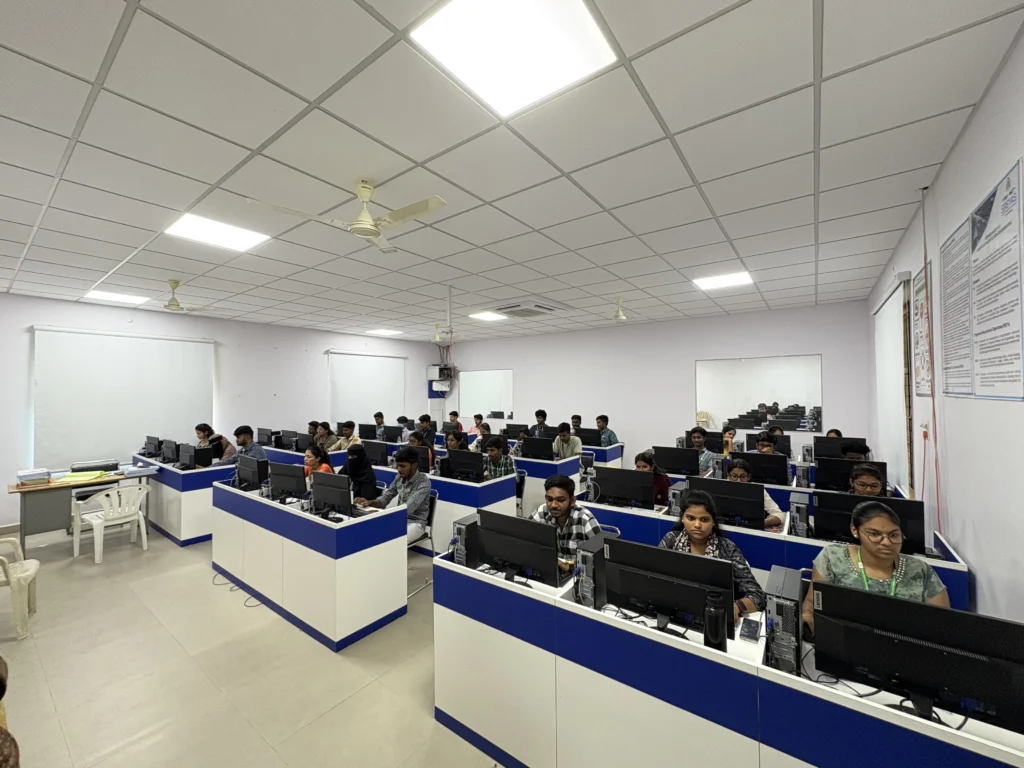
SKILL DEVELOPMENT COURSE (DATA VISUALIZATION-R PROGRAMMING/ POWER BI)
This lab is a part of B.Tech. II Year I Sem. for CSE students.
Course Objectives:
- Effective use of Business Intelligence (BI) technology (Tableau) to apply data visualization
- To discern patterns and relationships in the data.
- To build Dashboard applications.
- To communicate the results clearly and concisely.
- To be able to work with different formats of data sets.
Course Outcomes: At the end of the course a student should be able to
- Understand How to import data into Tableau.
- Understand Tableau concepts of Dimensions and Measures.
- Develop Programs and understand how to map Visual Layouts and Graphical Properties.
- Create a Dashboard that links multiple visualizations.
- Use graphical user interfaces to create Frames for providing solutions to real world problems.
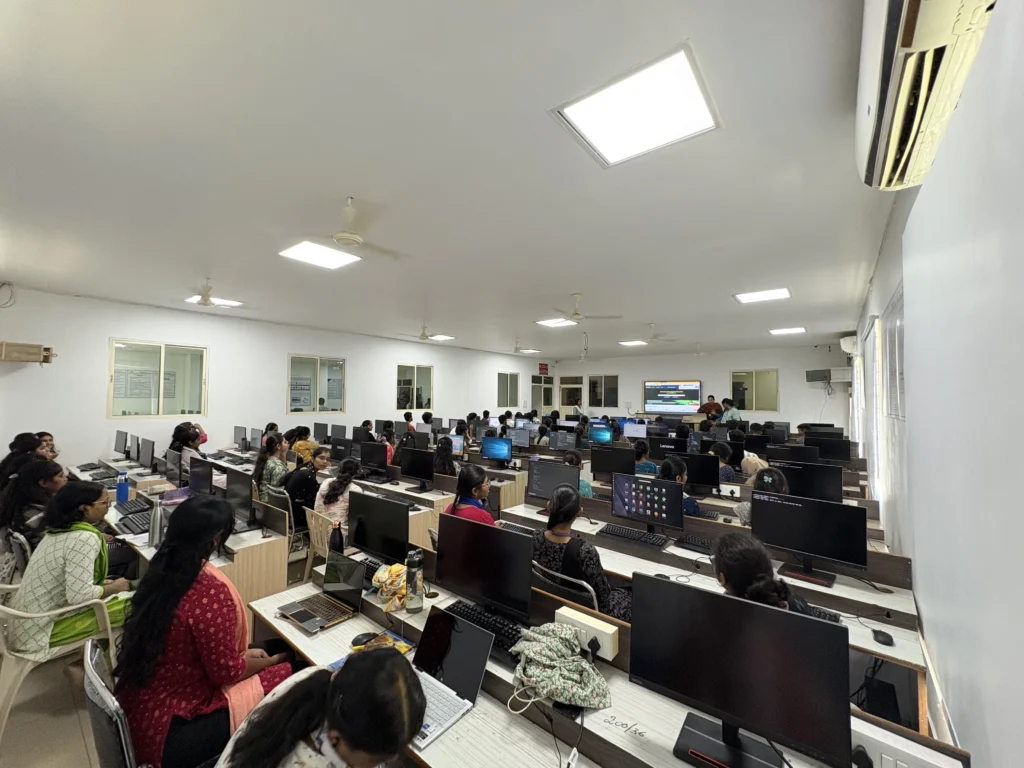 COMPUTER NETWORKS LAB
COMPUTER NETWORKS LAB
B.Tech. III Year I Sem.
- To understand the working principle of various communication protocols.
- To understand the network simulator environment and visualize a network topology and observe its performance
- To analyze the traffic flow and the contents of protocol frames
- Implement data link layer farming methods
- Analyze error detection and error correction codes.
- Implement and analyze routing and congestion issues in network design.
- Implement Encoding and Decoding techniques used in presentation layer
- To be able to work with different network tools
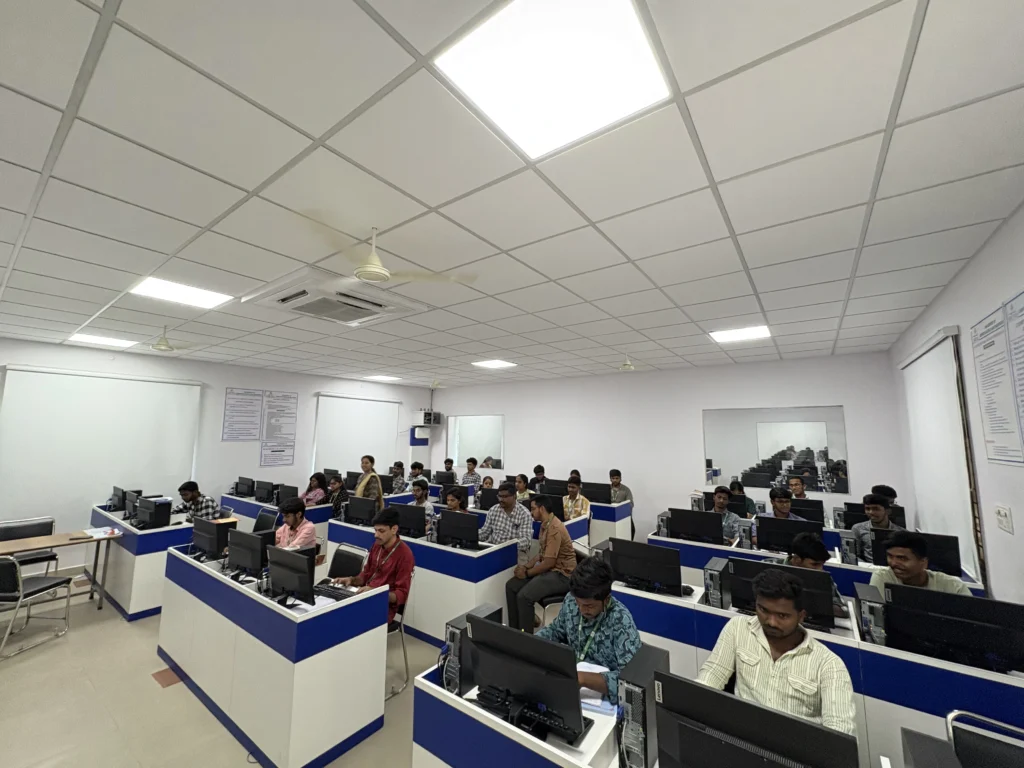
Web Technologies Lab
This lab is as a part of III B. Tech I semester for CSE students. The Learning Outcomes include:
– Gain a clear understanding of the fundamental web technologies such as HTML, CSS, JavaScript, and their roles in web development.
– Create forms, buttons, navigation menus, and other interactive elements.
– Develop a basic understanding of server-side scripting using technologies like PHP, Node.js, or Python (Django/Flask).
– Learn to interact with databases using SQL (MySQL, PostgreSQL, or MongoDB).
– Implement CRUD (Create, Read, Update, Delete) operations on the server side.
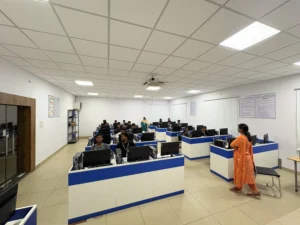
SKILL DEVELOPMENT COURSE (UI DESIGN-FLUTTER)
This lab is as a part of III B. Tech I semester for CSE students. The Objectives of this lab are to Implement Flutter Widgets and Layouts, understand Responsive UI Design with Navigation in Flutter, gain knowledge on Widgets and customize widgets for specific UI elements, Themes. The Learning Outcomes of this course include:
Implements Flutter Widgets and Layouts
Responsive UI Design and with Navigation in Flutter
Create custom widgets for specific UI elements and also Apply styling using themes and custom styles.
Design a form with various input fields, along with validation and error handling
Fetches data and write code for unit Test for UI components and also animation
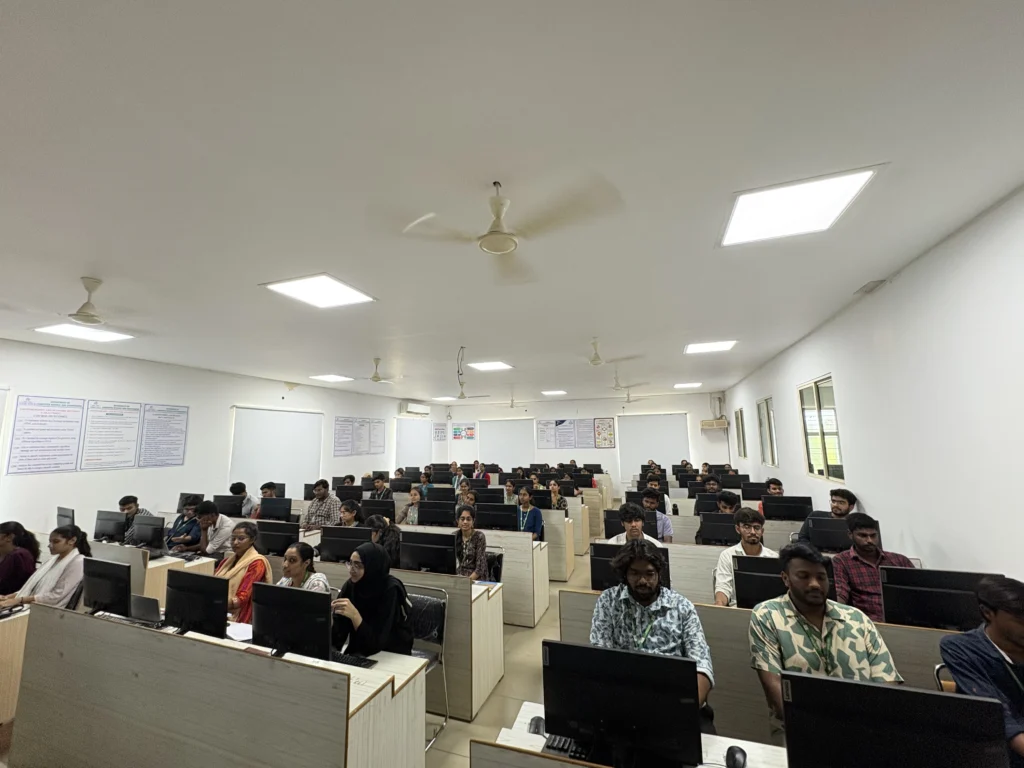 MACHINE LEARNING LAB
MACHINE LEARNING LAB
This lab is as a part of III B. Tech II semester for CSE students. The Objective of this lab is to get an overview of the various machine learning techniques and can demonstrate them using python. The Learning Outcomes are:
- Understand modern notions in predictive data analysis
- Select data, model selection, model complexity and identify the trends
- Understand a range of machine learning algorithms along with their strengths and weaknesses
Build predictive models from data and analyze their performance
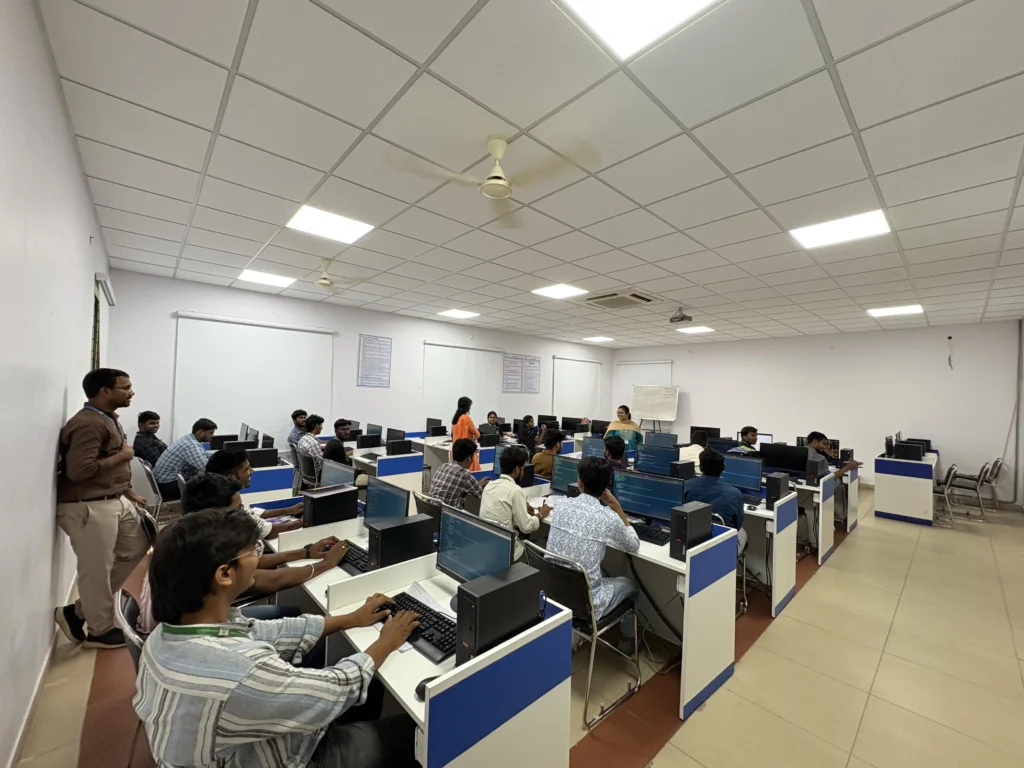 CLOUD COMPUTING LAB
CLOUD COMPUTING LAB
This lab is as a part of III B. Tech II semester for CSE students. The Objectives of this lab are to Understand the working of the AWS Cloud Services and Become familiar with Amazon’s storage offerings. The Learning Outcomes are:
- Identify the main concepts, key technologies, strengths and limitations of cloud computing.
- Illustrate the key and enabling technologies that help in the development of the cloud.
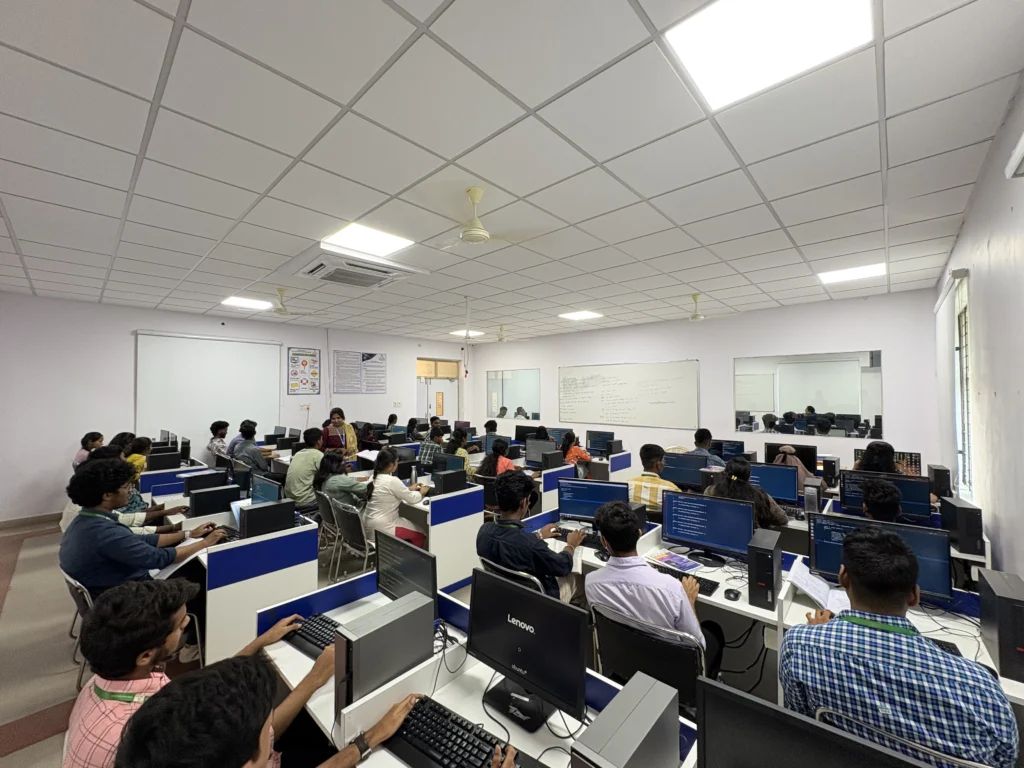 SCRIPTING LANGUAGES LAB
SCRIPTING LANGUAGES LAB
This lab is as a part of III B. Tech II semester for CSE students. The Objectives of this lab are to Understand the concepts of scripting languages for developing web based projects and understad the applications the of Ruby, TCL, Perl scripting languages. The Learning Outcomes are:
- Ability to understand the differences between Scripting languages and programming languages
- Gain some fluency programming in Ruby, Perl, TCL
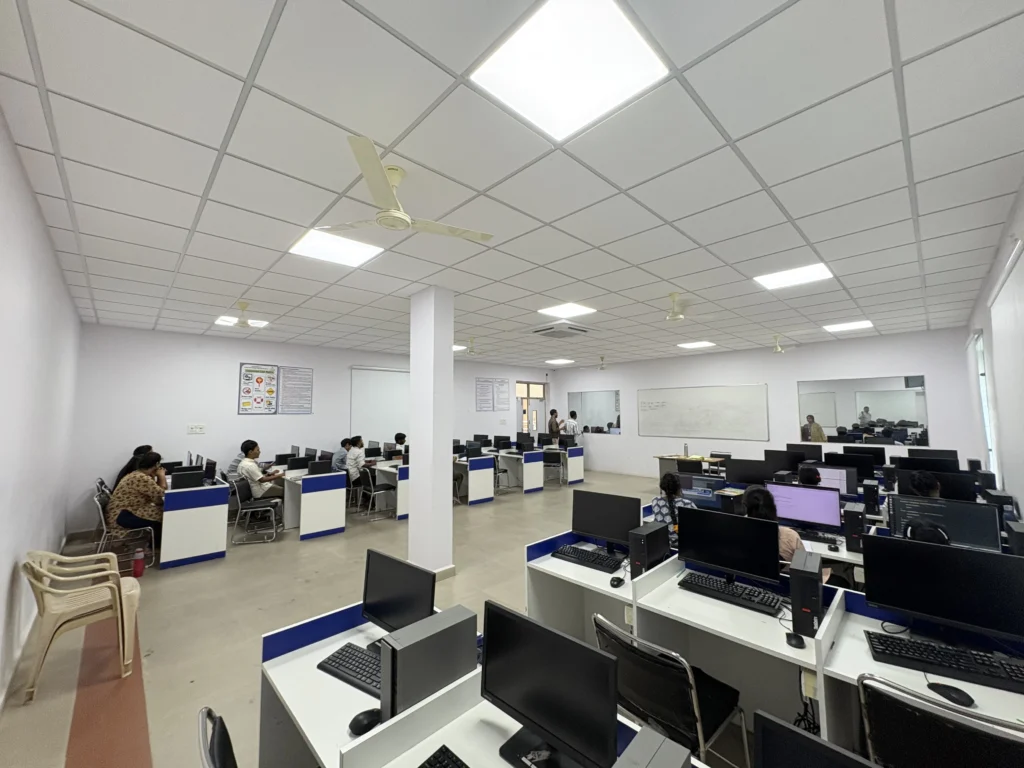
FULL STACK DEVELOPMENT LAB
This lab is as a part of III B. Tech II semester for CSE students. The Objective of this lab is to Introduce fast, efficient, interactive and scalable web applications using run time environment provided by the full stack components. The Learning Outcomes are:
- Design flexible and responsive Web applications using Node JS, React, Express and Angular.
- Perform CRUD operations with MongoDB on huge amount of data.
- Develop real time applications using react components.
- Use various full stack modules to handle http requests and responses.
